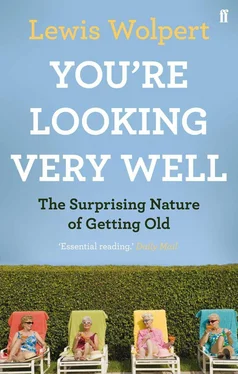A hormone secreted by the adrenal gland is half the level in men at age 60 compared to when they were 30. This reduction could be responsible for some of the ageing processes, but attempt to raise the levels in the old have not had useful effects. A number of other hormones, including growth hormone, testosterone, oestrogen and progesterone, have been shown in clinical trials to ameliorate some of the physiological changes associated with human ageing. No hormone, however, has been proved to significantly slow, stop or reverse ageing. It is possible that low testosterone could be the cause of tiredness, depression and sexual weakness in old men. Growth hormone is produced by the pituitary gland—a small structure at the base of the brain—that is necessary for childhood growth, and also helps maintain tissues and organs throughout life. Beginning in middle age, the pituitary gland slowly reduces the amount of growth hormone it produces. Some reports suggest that growth-hormone treatment of elderly individuals can lessen some of the negative physiological changes observed with advancing age, but the results in humans have been controversial. Advertisements claim that by supporting the body’s own natural production of growth nutrients, a human growth hormone such as Sytropin can have dramatic effects: ‘If you are not completely satisfied, simply return for a full refund! It can help you maintain vigour, energy, and youthful enthusiasm. It provides a natural source of essential growth nutrients to assist the body’s ability to withstand some of the harsh effects of ageing.’ There is little evidence for this, or that taking this supplement promotes either longevity or an increased quality of life.
Dame Linda Partridge is a geneticist who studies the biology and genetics of ageing. I asked her how well we are doing:
I think we understand it a lot better than we did because we have at last found a way in through the mutations in single genes that can extend lifespan in laboratory animals. This is a major discovery that started with the nematode worm and the longer lived worms remained healthy. Will those genes extend our lifespan? Probably yes as these genes can extend the lifespan of mice, and looking at old humans it seems similar processes are involved, like the insulin signalling pathway. It is not so much the increase in lifespan, but they keep the animal healthy as it ages and it covers a very broad spectrum of age related diseases, and so it’s not just that they do not get cancer or cardiovascular disease but they also get less osteoporosis, their skin is better. This is not what we expected to see. And it is jolly good news.
We need to make sure that this does help people. Not enough money is going into ageing research. The public needs to understand the advances and that it is a very good area to fund.
A possible problem is the relationship between scientists and clinical scientists, because geriatrics is mainly concerned with primary care and it is not very popular with students and does not have a strong research base. This means that it will probably be introduced with some medical speciality like endocrinology, cardiology or neurology. Pharmaceutical companies will make the connection—drugs will be the way in. It is most unlikely that it will involve modifying the genome. And one may have to take drugs for rather a long time as one is looking for prevention and so people will start taking the drug when they are middle-aged, and then continue for the rest of their lives—so the drugs have to be very safe. Life expectancy will probably continue to increase by two and a half years a decade. Immortality by altering our genes is beyond the limits of my imagination.
There is no evidence yet that dietary restriction helps with respect to ageing. When I meet people who are trying it they seem unhappy—their body temperature drops 2 degrees. Exercise is enormously beneficial to older people and quite simple exercise can make a significant difference to general mobility. I run two to three times a week—about 4 miles. I have found my ageing to have some enormous benefits and one or two irritations. One is into a health lottery with ageing and it depends on how that goes. I have been lucky as I have done nothing to look after my health. I do not think as fast as I use to, but enjoy the benefits of being more relaxed.
Getting rid of all diseases would, it is claimed, increase lifespan by adding only some 15 to 20 years to the current 80. For much longer lifespans, the ageing process in the cells and tissues itself would have to be reduced. There have been attempts to move in that direction, but even if immortality is not possible, can old age at least be delayed? The secret of long life is not known, and may not exist, but exercise and a good and varied diet seems to help. A study of 17,000 men from Harvard university over 30 years found that moderate exercise increased life by one or two years. Exercising regularly keeps the individual slim and fit, reduces stress, and increases the cardiovascular capability.
Evidence from animals is that limiting food intake, just eating less, can significantly extend the lifespan. When rats are kept in the laboratory under pleasant conditions but with an intake of food such that after weaning they get 50 per cent less than their well-fed neighbours, they live about 40 per cent longer. The oldest rat with high food intake is around 1,000 days old but there are those on the restricted intake who get to 1,500 days—50 per cent older. In female rats, the age at which the ability to reproduce is lost is extended from 18 months to 30 months. Vitamins and minerals must be included in the diet, but it does not matter if the reduced calories come from carbohydrates, proteins or fat.
Dietary restriction can increase mice longevity but can impair immunity and wound healing. Low intake of calories suppresses most of the diseases common in older animals such as cancer, high blood pressure and deterioration of the brain. If the restricted feeding regime is returned to full feeding, the ageing process then seems to be actually accelerated. Monkeys on a restricted diet were three times less likely to get age-related illnesses. At the end of the study half of those on a normal diet had died, while for those on a restricted diet it was only one in five.
Considerable effort is being devoted to understanding the molecular events mediating lifespan extension by dietary restriction, and whether sirtuins are involved. Many more studies in relation to dietary restriction are required for humans as there are negative side effects. A possible way to slow ageing would be to reduce metabolism by blocking receptors for insulin and growth hormone.
Evidence that humans could also delay ageing by reducing calorie intake comes from Japanese island of Okinawa, where there are probably more centenarians per 100,000 than anywhere else in the world. The average adult food intake is, for cultural reasons, 20 per cent less than the Japanese average, and schoolchildren on Okinawa eat less than two thirds of that recommended in Japan. The death rates from stroke, heart disease and cancer are only about two thirds that for Japan as a whole, and the death rate for 60-year-olds is half the national average.
Humans practising calorie restriction would reduce their calorie intake by about one quarter. For example, a person who needs 2,000 daily calories for weight maintenance might eat 1,500 to 1,600 calories a day on a calorie restriction diet. Eating so little might greatly increase lifespan, but who would want to live on just 1,600 calories a day? A single hamburger has 1,200 calories. But with the increasing prevalence of obesity, insulin resistance and type 2 diabetes, interventions targeting weight reduction and glucose control should be emphasised. Recent studies on the effects of lowering low-density lipoprotein cholesterol levels have shown a substantial reduction in mortality from coronary heart disease and nonfatal myocardial infarction rates, with a persistent effect in patients older than 75. Subjects with exceptional longevity and their offspring have significantly greater high-density lipoprotein, which reflect their general health and cognitive function performance. Rich diets shorten lifespan not because of excess calories but for more complex reasons—there is a dietary imbalance between fecundity and lifespan, each being maximised at different optimal nutritional levels. Certain amino acids—the structures from which proteins are built—can shorten lifespan in the fly but increase fecundity. This is a complex issue that is not yet solved.
Читать дальше












